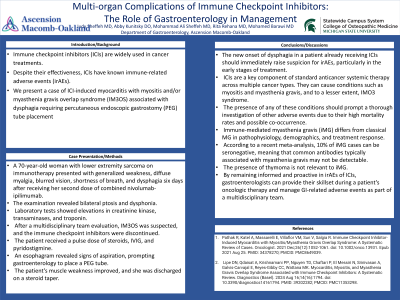Monday Poster Session
Category: General Endoscopy
P2432 - Multi-Organ Complications of Immune Checkpoint Inhibitors: The Role of Gastroenterology in Management
Monday, October 28, 2024
10:30 AM - 4:00 PM ET
Location: Exhibit Hall E

Has Audio
- JS
Judy Sheffeh, MD
Ascension Macomb-Oakland Hospital
Warren, MI
Presenting Author(s)
Judy Sheffeh, MD1, Rita Rehana, MD1, Mohammad Ali Sheffeh, MD2, Abby Kunitsky, DO3, Mohammed Barawi, MD4
1Ascension Macomb-Oakland Hospital, Warren, MI; 2Ascension Macomb, Warren, MI; 3McLaren Macomb Hospital, Mt. Clemens, MI; 4Ascension St. John Hospital, Detroit, MI
Introduction: Immune checkpoint inhibitors (ICIs) are widely used in cancer treatments. Despite their effectiveness, ICIs have known immune-related adverse events (irAEs). We present a case of ICI-induced myocarditis with myositis and/or myasthenia gravis overlap syndrome (IM3OS) associated with dysphagia requiring percutaneous endoscopic gastrostomy (PEG) tube placement.
Case Description/Methods: A 70-year-old woman with lower extremity sarcoma on immunotherapy presented with generalized weakness, diffuse myalgia, blurred vision, shortness of breath, and dysphagia six days after receiving her second dose of combined nivolumab-ipilimumab. The examination revealed bilateral ptosis and dysphonia. Laboratory tests showed elevations in creatinine kinase, transaminases, and troponin. After a multidisciplinary team evaluation, IM3OS was suspected, and the immune checkpoint inhibitors were discontinued. The patient received a pulse dose of steroids, IVIG, and pyridostigmine. An esophagram revealed signs of aspiration, prompting gastroenterology to place a PEG tube. The patient’s muscle weakness improved, and she was discharged on a steroid taper.
Discussion: The new onset of dysphagia in a patient already receiving ICIs should immediately raise suspicion for irAEs, particularly in the early stages of treatment. ICIs are a key component of standard anticancer systemic therapy across multiple cancer types. They can cause conditions such as myositis and myasthenia gravis, and to a lesser extent, IMO3 syndrome. The presence of any of these conditions should prompt a thorough investigation of other adverse events due to their high mortality rates and possible co-occurrence. Immune-mediated myasthenia gravis (iMG) differs from classical MG in pathophysiology, demographics, and treatment response. According to a recent meta-analysis, 10% of iMG cases can be seronegative, meaning that common antibodies typically associated with myasthenia gravis may not be detectable. The presence of thymoma is not relevant to iMG. By remaining informed and proactive in irAEs of ICIs, gastroenterologists can provide their skillset during a patient’s oncologic therapy and manage GI-related adverse events as part of a multidisciplinary team.
Disclosures:
Judy Sheffeh, MD1, Rita Rehana, MD1, Mohammad Ali Sheffeh, MD2, Abby Kunitsky, DO3, Mohammed Barawi, MD4. P2432 - Multi-Organ Complications of Immune Checkpoint Inhibitors: The Role of Gastroenterology in Management, ACG 2024 Annual Scientific Meeting Abstracts. Philadelphia, PA: American College of Gastroenterology.
1Ascension Macomb-Oakland Hospital, Warren, MI; 2Ascension Macomb, Warren, MI; 3McLaren Macomb Hospital, Mt. Clemens, MI; 4Ascension St. John Hospital, Detroit, MI
Introduction: Immune checkpoint inhibitors (ICIs) are widely used in cancer treatments. Despite their effectiveness, ICIs have known immune-related adverse events (irAEs). We present a case of ICI-induced myocarditis with myositis and/or myasthenia gravis overlap syndrome (IM3OS) associated with dysphagia requiring percutaneous endoscopic gastrostomy (PEG) tube placement.
Case Description/Methods: A 70-year-old woman with lower extremity sarcoma on immunotherapy presented with generalized weakness, diffuse myalgia, blurred vision, shortness of breath, and dysphagia six days after receiving her second dose of combined nivolumab-ipilimumab. The examination revealed bilateral ptosis and dysphonia. Laboratory tests showed elevations in creatinine kinase, transaminases, and troponin. After a multidisciplinary team evaluation, IM3OS was suspected, and the immune checkpoint inhibitors were discontinued. The patient received a pulse dose of steroids, IVIG, and pyridostigmine. An esophagram revealed signs of aspiration, prompting gastroenterology to place a PEG tube. The patient’s muscle weakness improved, and she was discharged on a steroid taper.
Discussion: The new onset of dysphagia in a patient already receiving ICIs should immediately raise suspicion for irAEs, particularly in the early stages of treatment. ICIs are a key component of standard anticancer systemic therapy across multiple cancer types. They can cause conditions such as myositis and myasthenia gravis, and to a lesser extent, IMO3 syndrome. The presence of any of these conditions should prompt a thorough investigation of other adverse events due to their high mortality rates and possible co-occurrence. Immune-mediated myasthenia gravis (iMG) differs from classical MG in pathophysiology, demographics, and treatment response. According to a recent meta-analysis, 10% of iMG cases can be seronegative, meaning that common antibodies typically associated with myasthenia gravis may not be detectable. The presence of thymoma is not relevant to iMG. By remaining informed and proactive in irAEs of ICIs, gastroenterologists can provide their skillset during a patient’s oncologic therapy and manage GI-related adverse events as part of a multidisciplinary team.
Disclosures:
Judy Sheffeh indicated no relevant financial relationships.
Rita Rehana indicated no relevant financial relationships.
Mohammad Ali Sheffeh indicated no relevant financial relationships.
Abby Kunitsky indicated no relevant financial relationships.
Mohammed Barawi: Abbvie – Speakers Bureau. Boston scietific – Consultant. Gilead – Speakers Bureau. Olympus – Consultant.
Judy Sheffeh, MD1, Rita Rehana, MD1, Mohammad Ali Sheffeh, MD2, Abby Kunitsky, DO3, Mohammed Barawi, MD4. P2432 - Multi-Organ Complications of Immune Checkpoint Inhibitors: The Role of Gastroenterology in Management, ACG 2024 Annual Scientific Meeting Abstracts. Philadelphia, PA: American College of Gastroenterology.
